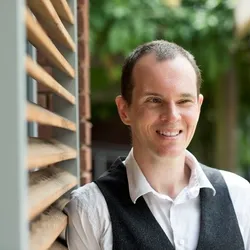Copyrights, patents and trademarks - how will Brexit affect intellectual property rights?
The second in a new series of briefs bringing current legal thinking to bear on public policy issues and contemporary concerns has been published today by GLOBE, a research centre within the University of Warwick’s Law School.
 Brexit: Mitigating Uncertainty in Intellectual Property Law and Policy by Dr Ben Farrand, Associate Professor at Warwick Law School (pictured, right), explores what the different proposed models of a future EU-UK relationship may mean for the UK’s intellectual property laws, policies, and ability to influence European and international norms in this field.
Brexit: Mitigating Uncertainty in Intellectual Property Law and Policy by Dr Ben Farrand, Associate Professor at Warwick Law School (pictured, right), explores what the different proposed models of a future EU-UK relationship may mean for the UK’s intellectual property laws, policies, and ability to influence European and international norms in this field.
In the paper, Dr Farrand identifies three benefits of intellectual property rights that have been amplified through EU membership in three key UK IP-intensive sectors; copyright for the creative sector including music, software and movies, patents for inventions like pharmaceuticals, and trademarks for brands and logos. These benefits at risk are:
- unrestricted access to the Single Market, including the Digital Single Market Strategy
- the power of EU trade influence, and
- the legal certainty in intellectual property rights within the Customs Union.
He comments: “Goods and services protected by intellectual property rights are a key British export, with a significant percentage of those exports going to countries in the EU.
“This means that when talking about IP post Brexit, we are not talking about new benefits or opportunities presented by new models of international trade and cooperation, but mitigating the negative impacts and minimising risks.”
This brief proposes policy options to mitigate these risks, considering four models of UK-EU relationship after Brexit.
Dr Andreas Kokkinis, Assistant Professor at Warwick Law School and editor of the briefing series, said: ‘‘I am delighted to launch the second Policy Brief of the GLOBE Centre Series on a topic so essential for the UK economy as intellectual property rights after Brexit. Dr Farrand’s incisive analysis cuts through political rhetoric and highlights the risks posed by Brexit for UK businesses and creative artists in terms of protection of their intellectual property.’’
- Download Brexit: Mitigating Uncertainty in Intellectual Property Law and Policy by Dr Ben Farrand.
NOTES
The Centre for Law, Regulation and Governance of the Global Economy (GLOBE) at Warwick Law School, created in 2014, is a research and public engagement centre that brings together staff and postgraduate students working in international economic law, business and commercial law, corporate governance and financial regulation.
The aim of the GLOBE policy brief series is to improve the factual base on which policy decisions are made and share cutting-edge academic research in an accessible and relevant manner with policymakers, the media, civil society groups and the general public.
CONTACT
Sara Prestleton
Marketing & Communications Officer
School of Law
University of Warwick
s.e.prestleton@warwick.ac.uk
Sheila Kiggins
Media Relations Manager
University of Warwick
S.Kiggins@warwick.ac.uk
02476 150423
07876 292821
